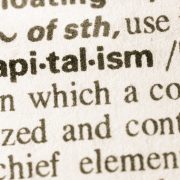In our postmodern turf war over linguistic territory, everything is fair game. For example, the meaning of words like liberal, freedom, justice, and value have been redefined by the dominant thought leaders in academia and media. Now Wall Street is getting in on the act with the word capitalism itself.
For the purpose here, capitalism is a socio-economic system of voluntary production and trade. It is conducted by free people, each trading value for value, with their own capital and ingenuity. It requires a rational code of morality, one in which all participants respect each other’s freedom to act on their judgment. Government involvement is limited to the enforcement of contracts and the protection of person and property. In other words liberal, freedom, justice, and value.
Even 18th century classical economists, as opposed in their ideology as David Ricardo and Karl Marx, agree on the basic analytical framework of capitalism and its wealth creating power. It is their opinions on capitalism’s outcomes for society as a whole where they diverge. Three hundred years later that has not changed, yet the turf war over the meaning of words continues to evolve.
The Sanctimony of the Witless
Because of Marx’s influence over 20th century political elites, capitalism and profits are still considered destructive human tendencies. And because of that, any political or corporate leaders who replace those words with social responsibility are awarded gold stars. To a classical capitalist, their social responsibility is fulfilled with every transaction. To a corporatist, social responsibility can mean anything that is politically expedient. And now that the US economy is setting records again, Wall Street is realizing that maybe capitalism is OK to talk about. After all, nothing else has ever created so much peace and prosperity, it just needs some polish – a new marketing campaign!
Enter JUST Capital, and their new manufacturing and distribution partner, Goldman Sachs. In June, this duo launched their first exchanged traded fund (a portfolio of stocks) on the New York Stock Exchange – the JUST US Large Cap Equity ETF (Ticker: JUST). According to JUST Capital CEO Martin Whitaker, “We are big believers in capitalism as a force for good. The goal is to have capital flow in a just direction.” He goes on to declare his ultimate prize as “We are modernizing the definition of capitalism.”
But who gets to decide what a just direction will look like? According to their website, “JUST Capital was co-founded in 2013 by a group of concerned people from the world of business, finance, and civil society – including Paul Tudor Jones II, Deepak Chopra, Rinaldo Brutoco, Arianna Huffington, Paul Scialla, and others.” You know, the usual muckety-mucks. And their hubris is astounding, not only is the term civil society redundant and meaningless, like social justice, they get to decide who its constituents are.
Clear, Crowdsourced, Commonsense Capitalism
To summarize, postmodern capitalism will correct the pernicious flow of capital to nefarious activities as directed by charlatans hand picked from anarchist mobs. OK, that sounds ridiculous, they have a better plan – drum roll please. The just flow of capital will be determined by “the true priorities of the American people.” Phew!
In order to get an accurate picture of what 320 million Americans think about complex systems, a foolproof methodology will be employed, the one that predicted the outcome of the 2016 US presidential election – professional pollsters. “To date, we have surveyed over 72,000 people from all around the country to identify the top issues when it comes to just business behavior. The results represent a clear, crowdsourced, and commonsense blueprint for the kind of marketplace people in the U.S. actually want.” What could go wrong with that – a poll of 72,000 people who know nothing about economic systems and have a baked-in aversion to capitalism? But seriously, this proposition is that a contrived poll will allocate capital more efficiently than 320 million people making purchases, or investing money, trading value for value, with the producers that actually create markets.
According to JUST Capital, it just so happens that the true priorities of the American people are aligned with the ESG reporting requirements of the greenwashing police. All of the metrics have an environmental, social, or governance component. “Through extensive quantitative polling, we then derive weights for the Drivers and Components, which correspond to their relative importance in the public’s opinion.”
The use of the term ‘quantitative’ is not random, its insidious. In capital markets, quantitative research requires unassailable data sets. To hijack the term at a time when it is gaining unprecedented acceptance as an investment management discipline is shameless.
Innovative Companies are Choosing Innovative Capitalists
In order to rationalize their behavior, JUST Capital claims to be restoring the confidence in capital markets that was lost ten years ago in the wake of the (government induced) mortgage banking collapse. The good news is, ESG reporting activism may be dead on arrival. According to Bloomberg Businessweek:
Companies are staying away from public markets in droves. From an annual rate of almost 700 new listings in the last half of the 1990s, the average has fallen 75 percent. The number of so-called activist investors making demands on public companies swelled past 500 for the first time in the first half of 2018. What we are really witnessing is an eclipse of public markets as the place where young successful American companies seek their funding.
The message is clear, innovators and wealth creators now have access to non-traditional sources of capital, the flow of which is directed by individuals trading value for value with their own capital and ingenuity. And it brings home another very important lesson, one ignored by central planners, regulators, and predatory reformers; innovation and capital will always move more nimbly and productively than the myopic and clumsy looters.













